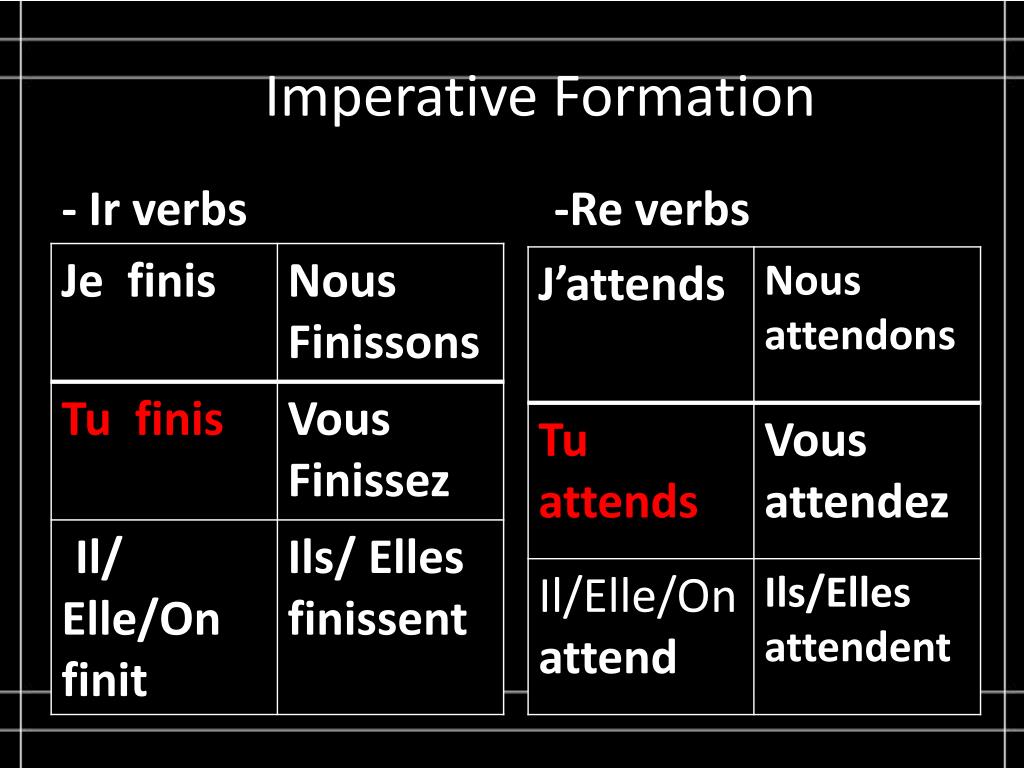

For most verbs, the imperative mood is constructed with the 2nd person singular of the Indikativpräsens (the present tense form) by taking off the “-st” ending. Now, let’s take a look at the conjugation of the second person singular forming the imperative. Let’s look at an example for the complete conjugation of the imperative with the verb trinken : Person All you need is just to know the infinitive of the verb + to whom the order is given ( wir (first person plural) or Sie (second person plural). The conjugation of the German imperative is very simple in the first and second person plural. Trinken Sie! – Drink! German Imperative Conjugation However, it is only in the Sie form of the imperative that the pronoun usually appears – in the “du” and “ihr” forms, the pronoun is generally dropped, which leaves us with only the verb. These correspond to the three different ways of saying you: du, ihr, Sie, and wir. There are four main forms of the imperative mood that are used to give instructions or orders to someone. The imperative is a form of the verb (grammatical mood) used when giving orders and instructions. Well, it is probably one of the grammar forms we all had probably learned when we were kids and our parents demanded us to do something.

What Is the German Imperative (or Befehlsform)? However, as in any foreign language, there are several things that might complicate the grammar a little bit – such as using it in different formal and informal situations or making it seem less rude.ĭo you want to learn the basics about forming the German imperative? In that case, read on and make sure that it sounds just the way you want it to. German imperative is used only in the present tense form with 2nd person singular and 1st and 2nd persons plural, which makes it pretty easy to learn.
Imperative german grammar for free#
Read more about exclamation marks.Rapidly Learn German with Readle: Download App for Free Never use more than one exclamation mark! It's considered crass. Does it mean "exactly seven o'clock" or does it mean "don't forget!") When writing a command, be mindful of how much force an exclamation mark adds and how that exclamation mark could be misinterpreted. (Point 2) Exclamation marks are easily misinterpreted. Read more about misusing "myself" on the page about reflexive pronouns. This means you can only pair your verb with "yourself" or "yourselves." You cannot pair your imperative verb with "myself." The subject of a verb in the imperative mood is an implied "you" (either singular or plural). Please contact your manager or myself with any suggestions.This is a common mistake, especially in work emails. (Point 1) Don't use "myself" with a verb in the imperative mood. That said, here are two noteworthy points related to the imperative mood. If I were there, I would paint the fence.įorming verbs in the imperative mood causes native English speakers few mistakes.I propose that Mark be made to paint the fence.What Is Mood? Mood is the form a verb takes to show how it is to be regarded (e.g., as a fact, a command, a wish, an uncertainty). However, shout is in the imperative mood.) ( I am going is the indicative mood (i.e., just a statement). Here are some more examples of verbs in the imperative mood (shaded): Verb in the imperative mood: If you've heard this story before, do not stop me, because I'd like to hear it again.Verb in the imperative mood: Next time I see you, remind me not to talk to you.Verb in the imperative mood: Take a leaflet.In English, the imperative mood uses the bare infinitive form (i.e., the version without "to"). The main verb (i.e., the finite verb) in an imperative sentence (i.e., one that makes a command) is said to be in the "imperative mood." It is in the indicative mood.)Ĭommands can include orders, requests, advice, instructions, and warnings. (This verb is not in the imperative mood. The imperative mood is a verb form that gives a command. What Is the Imperative Mood? (with Examples)


 0 kommentar(er)
0 kommentar(er)
